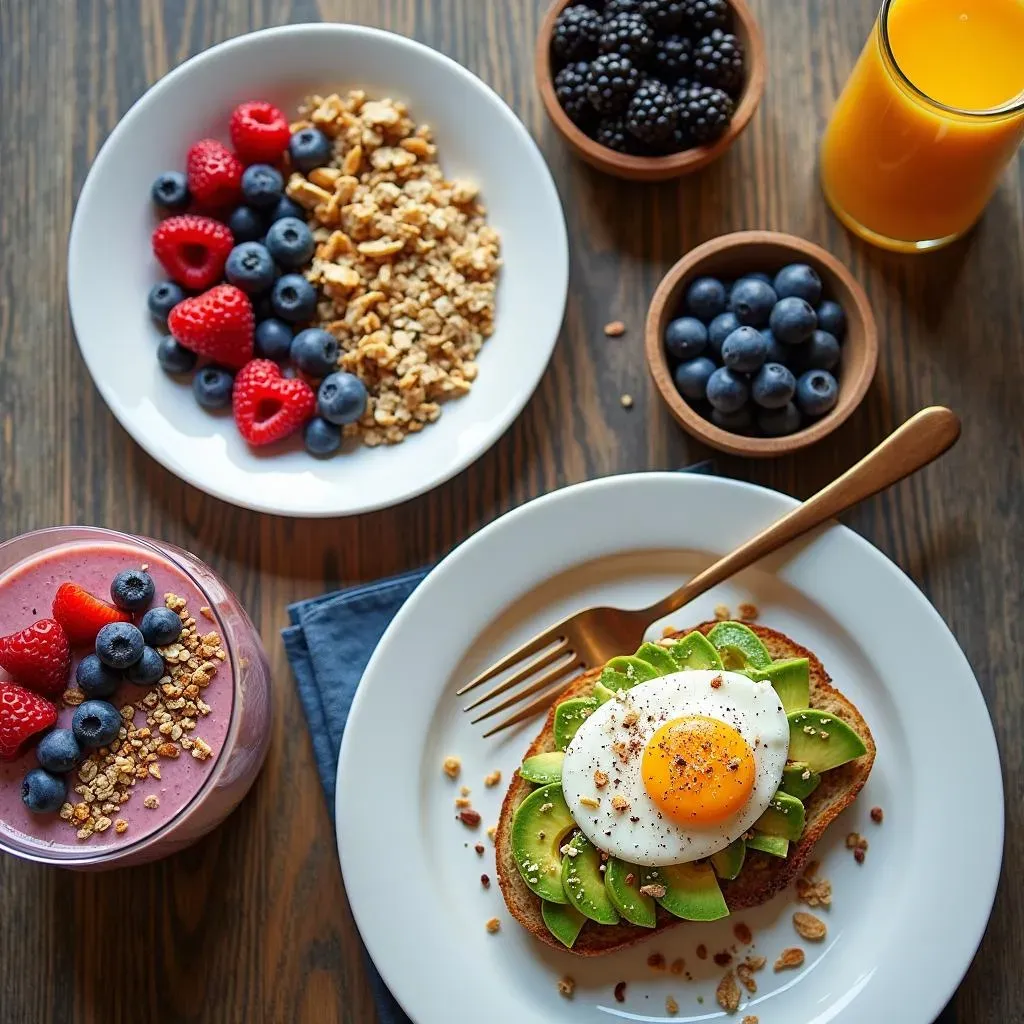Table of Contents
Are you tired of the same old boring meals? Do you struggle to find the time to cook healthy and delicious food? If so, you're not alone. Many people find it challenging to incorporate nutritious meals into their daily routines. But fear not, because this guide is here to revolutionize your approach to eating. We're diving deep into the world of 3 healthy meals for the day, showing you how to create a balanced and enjoyable eating plan that fits seamlessly into your lifestyle.
Kickstart Your Day: Delicious and Nutritious Breakfast Ideas

Kickstart Your Day: Delicious and Nutritious Breakfast Ideas
Fueling Your Morning the Right Way
Breakfast, often hailed as the most important meal of the day, sets the tone for your energy levels and overall well-being. But let's be real, grabbing a sugary pastry or skipping breakfast altogether is tempting when you're rushing out the door. The good news is that crafting a delicious and nutritious breakfast doesn't have to be time-consuming or complicated. It's all about making smart choices that provide sustained energy and essential nutrients to power you through your morning.
Think of your breakfast as an opportunity to load up on vitamins, minerals, and fiber. These components support your physical health and also boost your cognitive function, helping you stay focused and productive. Whether you're a fan of quick smoothies, hearty oatmeal, or savory egg dishes, there's a breakfast option out there to suit your taste and lifestyle. Let's explore some ideas that will make you excited to jump out of bed and embrace the day.
Quick & Easy Breakfast Recipes
Time is of the essence in the morning, so let's dive into some breakfast recipes that are both quick to prepare and packed with nutrients. These options are perfect for busy weekdays when you need something fast and fulfilling to keep you going until lunchtime.
- Overnight Oats: Combine rolled oats, chia seeds, milk (dairy or non-dairy), and your favorite toppings like berries, nuts, and a touch of honey in a jar the night before. Grab it from the fridge in the morning for a no-fuss breakfast.
- Smoothie Power Bowl: Blend frozen fruits, spinach, protein powder, and liquid (like almond milk or water) until smooth. Pour into a bowl and top with granola, seeds, and fresh fruit for added texture and nutrients.
- Avocado Toast: Toast whole-grain bread and top with mashed avocado, a sprinkle of red pepper flakes, and a fried or poached egg for a satisfying and protein-rich breakfast.
These are just a few ideas to get you started. Feel free to experiment with different ingredients and flavors to create breakfast combinations that you love and that fit your dietary needs.
The Importance of Protein and Fiber
When it comes to creating a truly nutritious breakfast, protein and fiber are your best friends. Protein helps keep you feeling full and satisfied, preventing mid-morning energy crashes and cravings. Fiber aids digestion, regulates blood sugar levels, and contributes to overall gut health.
Incorporating protein and fiber into your breakfast is easier than you might think. Add a scoop of protein powder to your smoothie, sprinkle chia seeds on your oatmeal, or include a side of Greek yogurt with your fruit. Small changes can make a big difference in the nutritional value of your breakfast and how it fuels your day.
Nutrient | Benefits | Food Sources |
|---|---|---|
Protein | Keeps you full, supports muscle growth | Eggs, Greek yogurt, nuts, seeds, protein powder |
Fiber | Aids digestion, regulates blood sugar | Oats, fruits, vegetables, whole grains |
Midday PowerUp: Satisfying Lunch Options for Sustained Energy

Midday PowerUp: Satisfying Lunch Options for Sustained Energy
Beating the Afternoon Slump
Lunchtime often feels like a brief oasis in a desert of deadlines and to-do lists. But instead of reaching for a heavy, processed meal that will leave you feeling sluggish, why not use this opportunity to fuel your body with a lunch that provides sustained energy and keeps you focused throughout the afternoon? A well-planned lunch is essential for maintaining productivity, boosting your mood, and preventing that dreaded afternoon slump.
The key to a satisfying and energizing lunch is to focus on whole, unprocessed foods that are rich in nutrients. Think lean proteins, complex carbohydrates, and healthy fats. These foods provide a steady release of energy, keeping your blood sugar levels stable and preventing energy crashes. So, ditch the fast food and sugary drinks and let's explore some lunch options that will help you conquer the rest of your day.
Lunchtime Superstars: Recipe Ideas
Let’s brainstorm some lunch ideas that are both delicious and nutrient-packed. These recipes are designed to be easy to prepare, whether you're packing a lunchbox for work or whipping up a quick meal at home.
- Quinoa Salad with Roasted Vegetables: Combine cooked quinoa with roasted vegetables like broccoli, bell peppers, and sweet potatoes. Add a vinaigrette dressing and some crumbled feta cheese for a flavorful and filling lunch.
- Chicken or Chickpea Salad Sandwich: Use whole-grain bread to make a sandwich with chicken or chickpea salad (made with Greek yogurt instead of mayonnaise for a healthier twist). Add lettuce, tomato, and cucumber for extra nutrients.
- Lentil Soup: Prepare a batch of lentil soup on the weekend and enjoy it throughout the week for a hearty and protein-rich lunch. Add some whole-grain bread or a side salad for a complete meal.
Don't be afraid to get creative and customize these recipes to your liking. The most important thing is to choose ingredients that you enjoy and that provide the nutrients your body needs to thrive.
Hydration and Portion Control
Besides the food itself, hydration and portion control play a crucial role in maintaining energy levels throughout the afternoon. Dehydration can lead to fatigue and decreased cognitive function, so make sure to drink plenty of water throughout the day.
Also, be mindful of your portion sizes. Overeating can lead to sluggishness and discomfort, while undereating can leave you feeling hungry and distracted. Aim for a balanced portion that provides enough energy to sustain you until your next meal or snack.
Tip | Description |
|---|---|
Stay Hydrated | Drink water throughout the day to prevent fatigue. |
Control Portions | Avoid overeating or undereating to maintain energy levels. |
Evening Nourishment: Healthy Dinner Recipes to End the Day Right

Evening Nourishment: Healthy Dinner Recipes to End the Day Right
Winding Down with Nutritious Choices
As the day winds down, it's tempting to opt for takeout or a quick, processed meal. However, dinner presents a crucial opportunity to nourish your body with foods that promote relaxation, recovery, and restful sleep. A healthy dinner should be balanced, incorporating lean protein, complex carbohydrates, and healthy fats to support overall well-being and prepare you for a night of restorative sleep. Prioritizing evening nourishment is an act of self-care that can significantly impact your physical and mental health.
Think of your dinner as a way to replenish your body after a long day and provide it with the building blocks it needs to repair and rebuild overnight. Choosing the right foods can also help regulate your sleep-wake cycle, making it easier to fall asleep and stay asleep throughout the night. Let's explore some dinner recipes that are both delicious and conducive to a good night's rest.
Dinner Recipes for Restful Nights
These dinner recipes are designed to be easy to prepare and packed with nutrients that promote relaxation and sleep. They're perfect for busy weeknights when you want a satisfying meal without spending hours in the kitchen.
- Baked Salmon with Roasted Asparagus: Salmon is rich in omega-3 fatty acids, which have been shown to improve sleep quality. Asparagus is a good source of folate and fiber, which are essential for overall health.
- Chicken and Vegetable Stir-Fry: Use lean chicken breast and a variety of colorful vegetables like broccoli, carrots, and bell peppers. Stir-fry with a low-sodium soy sauce and serve over brown rice for a complete and balanced meal.
- Turkey Meatloaf with Sweet Potato Mash: Turkey is a good source of tryptophan, an amino acid that promotes relaxation and sleep. Sweet potatoes are rich in fiber and vitamins, making them a healthy and satisfying side dish.
Feel free to adjust these recipes to your liking and experiment with different flavors and ingredients. The most important thing is to choose foods that you enjoy and that support your overall health and well-being.
Smart Snacking: Bridging the Gaps Between Your 3 Healthy Meals

Smart Snacking: Bridging the Gaps Between Your 3 Healthy Meals
The Art of Strategic Snacking
So, you've nailed your breakfast, lunch, and dinner, but what about those pesky hunger pangs that strike in between? That's where smart snacking comes in! Snacking isn't about mindlessly munching on chips or cookies; it's about strategically fueling your body with nutrients to maintain energy levels, prevent overeating at meals, and support your overall health. Think of snacks as mini-meals that bridge the gaps between your 3 healthy meals for the day, keeping you satisfied and focused.
The key to successful snacking is to choose nutrient-dense options that provide sustained energy without derailing your healthy eating plan. Avoid processed snacks that are high in sugar, unhealthy fats, and artificial ingredients. Instead, opt for whole foods that are rich in protein, fiber, and healthy fats. These nutrients will help keep you feeling full and satisfied, preventing cravings and promoting stable blood sugar levels. Let's explore some smart snacking strategies that will help you stay on track and reach your health goals.
Snack Attack: Healthy Options to Keep You Going
Let's get down to the nitty-gritty and explore some snack options that are both delicious and nutritious. These snacks are designed to be easy to prepare and portable, making them perfect for busy lifestyles.
- A handful of almonds or walnuts: Nuts are a great source of healthy fats, protein, and fiber.
- A small container of Greek yogurt with berries: Greek yogurt is packed with protein, and berries are rich in antioxidants.
- Apple slices with peanut butter: This combination provides a balance of carbohydrates, protein, and healthy fats.
Remember, portion control is key when it comes to snacking. Aim for a small serving that will satisfy your hunger without overdoing it. And don't be afraid to get creative and experiment with different snack combinations to find what works best for you.
Timing is Everything: When to Snack Smart
Knowing when to snack is just as important as knowing what to snack on. Pay attention to your body's hunger cues and plan your snacks accordingly. If you find yourself feeling hungry between meals, that's a sign that you need to incorporate a snack into your routine.
A good rule of thumb is to snack about halfway between meals. For example, if you eat breakfast at 7 am and lunch at noon, aim for a snack around 9:30 am. This will help prevent you from getting overly hungry and overeating at lunchtime.
Snack Timing | Benefits |
|---|---|
Mid-morning (between breakfast and lunch) | Prevents mid-day energy crash and overeating at lunch. |
Mid-afternoon (between lunch and dinner) | Keeps you focused and energized, prevents unhealthy cravings before dinner. |
Maintaining a Balanced Diet: The Key to Sustaining 3 Healthy Meals for the Day

Maintaining a Balanced Diet: The Key to Sustaining 3 Healthy Meals for the Day
The Big Picture: It's More Than Just 3 Meals
so you've got your breakfast, lunch, and dinner game strong. But let's zoom out for a sec. Maintaining a balanced diet isn't just about those individual meals; it's about the overall pattern of your eating habits. It's about ensuring that you're consistently providing your body with the right nutrients in the right proportions to support optimal health and well-being. Think of it like this: your 3 healthy meals for the day are the foundation, but the rest of your dietary habits are the walls, roof, and finishing touches that make it a solid, sustainable structure. It is about creating a lifestyle that promotes long-term wellness rather than just focusing on short-term fixes.
Understanding Macronutrients and Micronutrients
To truly master the art of maintaining a balanced diet, you need to understand the roles of macronutrients and micronutrients. Macronutrients—protein, carbohydrates, and fats—provide your body with energy and are essential for various bodily functions. Micronutrients—vitamins and minerals—are needed in smaller amounts but are equally important for maintaining health. Each plays a unique role, and a deficiency in any of them can lead to health problems.
Protein is crucial for building and repairing tissues, carbohydrates provide energy, and fats are essential for hormone production and nutrient absorption. Vitamins and minerals support everything from immune function to bone health. A balanced diet should include a variety of foods from all food groups to ensure that you're getting all the nutrients you need. It's like an orchestra; each instrument (nutrient) plays a vital role in creating a harmonious symphony (good health).
Nutrient Type | Examples | Benefits |
|---|---|---|
Macronutrients | Protein, Carbohydrates, Fats | Energy, tissue repair, hormone production |
Micronutrients | Vitamins, Minerals | Immune function, bone health, overall well-being |
Planning and Preparation: Setting Yourself Up for Success
One of the biggest challenges in maintaining a balanced diet is simply finding the time to plan and prepare healthy meals. Life gets busy, and it's easy to fall into the trap of convenience foods and takeout. That's why planning and preparation are so crucial. Taking a little time each week to map out your meals and snacks can make a huge difference in your ability to stick to your healthy eating goals. You can avoid impulsive, unhealthy choices and ensure that you always have nutritious options on hand.
Start by creating a meal plan for the week. Consider what you'll eat for breakfast, lunch, dinner, and snacks. Make a grocery list based on your meal plan and stick to it when you go shopping. Prepare some ingredients in advance, such as chopping vegetables or cooking grains, to save time during the week. With a little planning and preparation, you can make healthy eating a seamless part of your daily routine.
Listen to Your Body: Intuitive Eating
While planning and preparation are important, it's also crucial to listen to your body's cues and practice intuitive eating. This means paying attention to your hunger and fullness signals and eating when you're hungry and stopping when you're satisfied. Avoid restrictive diets or rigid rules that can disconnect you from your body's natural wisdom. Trust yourself to make healthy choices based on your individual needs and preferences. You're the expert on your own body, so listen to what it's telling you. It's a skill that takes time and practice to develop, but it's well worth the effort.
Hydration: The Often-Forgotten Element
We've talked a lot about food, but let's not forget about hydration! Water is essential for virtually every bodily function, and staying properly hydrated is crucial for maintaining a balanced diet and overall health. Water helps transport nutrients, regulate body temperature, and flush out toxins. Aim to drink plenty of water throughout the day, especially before, during, and after meals.
Carry a water bottle with you and sip on it throughout the day. If you find plain water boring, try adding some slices of lemon, cucumber, or berries for flavor. Avoid sugary drinks like soda and juice, which can contribute to weight gain and other health problems. Remember, staying hydrated is a simple but powerful way to support your overall well-being.
- Carry a water bottle with you.
- Add flavor with fruits or herbs.
- Avoid sugary drinks.
Embrace the Power of 3 Healthy Meals for the Day
Embarking on a journey towards better health doesn't require drastic measures or restrictive diets. By focusing on incorporating 3 healthy meals for the day, you can lay the foundation for sustained energy, improved well-being, and a happier relationship with food. Remember, consistency is key. Experiment with different recipes, find what works best for your taste and lifestyle, and don't be afraid to adjust along the way. The power to transform your health lies within your daily choices. Start today and experience the incredible benefits of nourishing your body with 3 healthy meals for the day.